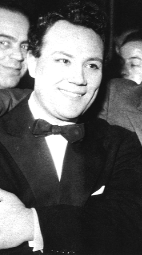fiction.wikisort.org - Actor
Claudio Villa (born Claudio Pica; 1 January 1926 – 7 February 1987) was an Italian singer and actor.
This article may be expanded with text translated from the corresponding article in Italian. (October 2009) Click [show] for important translation instructions.
|
Claudio Villa | |
|---|---|
 Claudio Villa | |
| Born | Claudio Pica 1 January 1926 Rome, Italy |
| Died | 7 February 1987 (aged 61) Padua, Italy |
| Occupation | Singer, operatic tenor, actor |
| Years active | 1932–1987 |
| Height | 1.62 m (5 ft 4 in) |
| Spouses | Miranda Bonansea
(m. 1952; div. 1962)Patrizia Baldi (m. 1975) |
Biography

Tenor Claudio Villa was born Claudio Pica in the Trastevere quarter of Rome in 1926. He recorded over 3000 songs, sold 45 million records, and appeared in 25 musicals during his career.[1][2]
His parents gave him the name "Claudio" in honor of Claudio Serio. Many songs made famous by Villa, like "'A Tazza 'E Cafe'," were recorded for the Fonit Cetra label.
Villa died in 1987; on his gravestone are the words "Vita sei bella, morte fai schifo" ("Life, you are fine; death, you stink").

Together with Domenico Modugno Villa holds the record for the most wins at the Sanremo Music Festival, where he won the competition in 1955, 1957, 1962 and 1967. In 1963 he won the Festival di Napoli with the song "Jamme ja". He also sang at another Italian music competition, Canzonissima, a television event shown on RAI from 1956 to 1974. He won Canzonissima in 1964 with "O sole mio" and in 1966 with "Granada". He competed in the Eurovision Song Contest: in 1962 he sang "Addio, addio" and came in ninth; in 1967 he sang "Non andare più lontano", finishing eleventh.[2][3]
In 1957, he was subjected to a curious trial by the Sorrisi e Canzoni magazine, after his declaration deemed presumptuous and immodest (the famous phrase of the "pedestal"), in which the public was asked to vote for guilt or acquittal. He will be acquitted. The same procedure will be repeated in 1960, and from the pages of the magazine he will receive a defensive harangue by Pier Paolo Pasolini, who will take sides for the singer's acquittal. He will be acquitted with the vote of 138,225 readers.[4]
His death in 1987 by a heart attack was announced live by host Pippo Baudo during the last night of that year's Sanremo Festival.[2][3] His tomb, surrounded by bas-relief and wall-paintings made in occasion of 20th anniversary of death, is located in San Sebastiano cemetery in Rocca di Papa, near Rome, where he lived for many years with his family.
The singer was largely unknown in North America until the 1996 film Big Night was released, co-directed by Stanley Tucci and Campbell Scott. The film won international acclaim. The soundtrack includes three Claudio Villa songs: "Stornelli Amorosi", "La Strada Del Bosco" and "Tic Ti, Tic Ta". According to the liner notes accompanying the CD, "Stanley grew up listening to vocalists such as Carlo Buti and Claudio Villa, huge names in Italy but little known here. Villa is a master of the stornello, a traditional song style that we thought had just the right, delicate feeling for the film's opening. But we and co-director Campbell Scott were further amazed by Villa when in the editing room, we chanced upon his boisterous "Tic Ti, Tic Ta" and his shamelessly romantic "La Strada del Bosco".[5]
Selected filmography
- Song of Spring (1951)
- Serenata amara (1952)
- Solo per te Lucia (1952)
- Love Song (1954)
- Ore 10: lezione di canto (1955)
- Primo applauso (1956)
- Serenate per 16 bionde (1957)
- L'amore nasce a Roma (1958)
- Fountain of Trevi (1960)
References
- Felice Liperi (March 27, 2007). "Morandi celebra il "reuccio"". La Repubblica. Retrieved October 31, 2016.
- "90 anni fa nasceva il 'reuccio' Claudio Villa". Adnkronos. December 23, 2015. Retrieved October 31, 2016.
- Enrico Deregibus (October 8, 2010). Dizionario completo della Canzone Italiana. Giunti Editore, 2010. ISBN 978-8809756250.
- "Claudio Villa e Pier Paolo Pasolini. Stima e citazioni di due personaggi all'apparenza distanti". February 7, 2017.
- Big Night Original Motion Picture Soundtrack, liner notes.
На других языках
- [en] Claudio Villa
[ru] Вилла, Клаудио
Кла́удио Ви́лла (итал. Claudio Villa; Рим, 1 января 1926 года — Падуя, 7 февраля 1987 года) — итальянский певец. Иногда он выступал автором, на его имя записано 35 песен. За всю свою карьеру он продал 45 миллионов пластинок по всему миру[1].Другой контент может иметь иную лицензию. Перед использованием материалов сайта WikiSort.org внимательно изучите правила лицензирования конкретных элементов наполнения сайта.
WikiSort.org - проект по пересортировке и дополнению контента Википедии